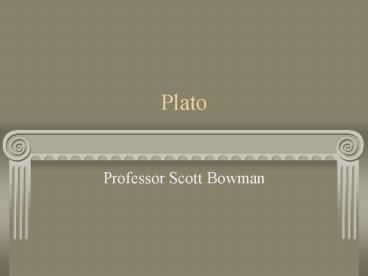Plato - PowerPoint PPT Presentation
1 / 20
Title:
Plato
Description:
Plato, one of the most famous philosophers of ancient Greece, was the first to ... philosophy opposed to empiricism is rationalism, represented by such thinkers as ... – PowerPoint PPT presentation
Number of Views:1228
Avg rating:3.0/5.0
Title: Plato
1
Plato
- Professor Scott Bowman
2
Socrates
Plato
Parmenides Universe
Heracltis Multi-verse
Protagerous Relativist
3
Plato
4
Plato, one of the most famous philosophers of
ancient Greece, was the first to use the term
philosophy, which means love of knowledge. Born
around 428 BC, Plato investigated a wide range of
topics. Chief among his ideas was the theory of
forms, which proposed that objects in the
physical world merely resemble perfect forms in
the ideal world, and that only these perfect
forms can be the object of true knowledge. The
goal of the philosopher, according to Plato, is
to know the perfect forms and to instruct others
in that knowledge.
5
Plato
Real world
Ideal world
Transcendent world
Reality
Appearance
6
Plato
- Appearance of reality
- World of appearances with reality shining through
- True is present in all
- All need to be involved in dialectic to get to
truth.
7
(No Transcript)
8
What problems did Plato identify in the thinking
of his fellow Philosophers and what was his
solution to those problems.
9
Reason Understanding Knowledge Takes place in
the MIND
THE THING ITSELF
Also the experience of THINGS
10
THE WORLD OF THE SENSES IS ALWAYS CHANGING
ALWAYS GROWING OR DISINTEGRATING OR DEPENDENT
ON PERCEPTION AND TIME THE WORLD OF TRUTH SHOULD
BE UNCHANGING FUNDAMENTAL REALITY -- "THE REALLY
REAL" SHOULD BE
11
PLATOS SOLUTION
There is a transcendent and objective world
beyond the scope of the sensory world
The world of BEING
12
(No Transcript)
13
The Matrix
14
THE WORLD OF BEING IS GRASPED DIRECTLY BY THE
MIND
THE THING ITSELF
The world of Becoming
15
The problem of the gap between the content of
perception and the thing itself
16
(No Transcript)
17
A student of ancient Greek philosopher Plato,
Aristotle shared his teachers reverence for
human knowledge but revised many of Platos ideas
by emphasizing methods rooted in observation and
experience. Aristotle surveyed and systematized
nearly all the extant branches of knowledge and
provided the first ordered accounts of biology,
psychology, physics, and literary theory. In
addition, Aristotle invented the field known as
formal logic, pioneered zoology, and addressed
virtually every major philosophical problem known
during his time. Known to medieval intellectuals
as simply the Philosopher, Aristotle is
possibly the greatest thinker in Western history,
and historically, perhaps the single greatest
influence on Western intellectual development.
18
Empiricism, in philosophy, a doctrine that
affirms that all knowledge is based on
experience, and denies the possibility of
spontaneous ideas or a priori thought. Until the
20th century the term empiricism was applied to
the view held chiefly by the English philosophers
of the 17th, 18th, and 19th centuries. Of these
the English philosopher John Locke was the first
to give it systematic expression. The philosophy
opposed to empiricism is rationalism, represented
by such thinkers as the French philosopher René
Descartes.Rationalists assert that the mind is
capable of recognizing reality by means of the
reason, a faculty that exists independent of
experience.
19
Although we accept that moral decisions will
always be affected by the situation and the
context we affirm that there are some things that
are RIGHT because they are RIGHT and others acts
that are WRONG because they are WRONG and that
every sane and normal person knows this!
There are no objective moral
truths. The ground upon which
moral decisions may be made must be
discovered within the subjective processes
of the individual-in-society!
THE GREAT ETHICAL DIVIDE
20
The Rationalist discourse we hold these truths
to be self evident and the Empiricist
discourse truth is discovered in experience































